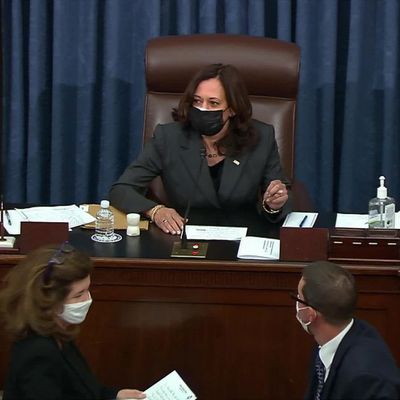
In the wake of U.S. Supreme Court Justice Stephen Breyer announcing he’ll retire at the end of this term and the White House affirming President Joe Biden’s public pledge to appoint the first Black woman to the Court, conservative gabbers immediately came up with a ridiculous scheme that fit their propaganda needs. Here’s the New York Post:
As news broke about Supreme Court Justice Stephen Breyer retiring, speculation ramped up that President Biden could tap embattled Vice President Kamala Harris to replace him — keeping his promise to appoint a black woman to the high court while opening possibilities of a less politically tainted running mate for 2024.
Former White House press secretary Kayleigh McEnany on Wednesday endorsed the unlikely notion that Harris could get the nomination as a way to end the controversies surrounding her.
Yeah, like McEnany has great sources inside the Biden White House. Spoiler alert: Harris isn’t going anywhere, and this “speculation” is pure partisan mischief, not to mention stupid.
But there is one angle to the Supreme Court opening involving Harris that might be more significant. In September 2020, retired Harvard University law professor Laurence Tribe, a long-time adviser to Democrats on constitutional issues, penned an op-ed arguing that then-Vice-President Mike Pence would not have the power to break a Senate tie in a vote over the confirmation of Supreme Court nominee Amy Coney Barrett. Quoting a Federalist Paper essay by Alexander Hamilton and citing Senate precedents, Tribe argued that asserting vice-presidential tiebreaking powers in judicial nominations should be disturbing to the constitutional “originalists” making up the conservative legal establishment. And in fact, as Tribe pointed out, Pence had been the very first veep to cast a tiebreaking vote in a lower-court judicial confirmation in December 2018.
Tribe was mostly focused on challenging Republican senators who were “hiding behind Pence’s skirt” on the extremely expedited Barrett confirmation vote, which at one point looked as if it could wind up in a tie. As it happened, Barrett was confirmed by a 52-to-48 vote with just one Republican (Susan Collins) crossing the partisan barricades. So Pence didn’t have to get involved.
That was then. This is now. The Senate is knotted up 50-50 between the parties, though Democrats control the floor and committee chairmanships via a power-sharing agreement thanks to Harris’s tiebreaking power over Senate business and regular legislation. In her year in office, the veep has broken 15 ties in the Senate. But none have been on confirmation votes for judicial nominees high or low. RealClearPolitics suggests Tribe’s theory is one that Senate Judiciary Committee Republicans are looking into, presumably with bad intent.
Most scenarios for a confirmation of Breyer’s successor have assumed a party-line vote with the big question of whether Joe Manchin and Kyrsten Sinema, who have given so much heartache to Biden and their Democratic colleagues in this Congress, will be a problem (so far, they have not voted against the confirmation of any of Biden’s nominees for district court or court of appeals positions). If Harris cannot break a tie, the White House would have to recruit at least one Republican from among the theoretically persuadable universe of frequent dissidents like Collins and Lisa Murkowski or the senators retiring at the end of this year. Depending on the perceived philosophical bent of Biden’s nominee, there could be some risk of a “centrist bloc” forming in the Senate to force a different choice. But if a party-line vote can win the confirmation, the odds of that happening drop significantly.
Tribe’s theory hasn’t been tested in a court of law, and for that matter, courts of law are typically reluctant to tell Congress how to carry out legislative chores, even those touching on the judiciary itself. If Republicans decide this is a fruitful avenue for messing with Biden, they would probably have to raise it initially with the Senate parliamentarian. But any ruling she made could be overturned by the Senate itself, and in that eventuality, Harris could definitely cast a tiebreaking vote, leaving a lawsuit as the only remedy. Denying Democrats the tie-breaker is a long shot at best. But Democrats would be wise to firm up their own ranks and recruit a Republican or two after assuring, of course, that Biden’s pick for the Supreme Court has no obvious weaknesses.






























